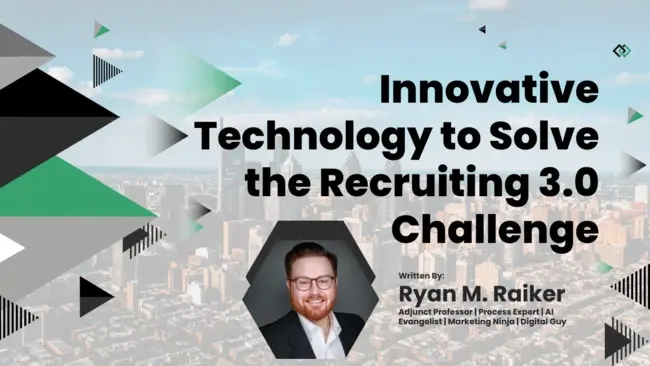Recruiting is a vital part of any business, and it’s important to stay up-to-date on the latest trends when it comes to hiring the best talent. As technology advances over the next few years, so too will recruitment trends continue to evolve—for both employers and job seekers alike. The ability to hire the right people for a job determines the company’s success and even its survival itself. This paper reviews Recruiting 3.0 as a critical mechanism in high-skilled recruiting and identifies its applicability, challenges, and best practices.
So what does the future of recruiting have in store?

Let’s take a look at what we can expect from recruiting in 2023—and beyond
Data-Driven Decision Making
Data-driven decision-making is already becoming increasingly popular among recruiters and will only become more commonplace as we move into 2023 and beyond. Having access to data about candidates can be incredibly helpful for recruiters, allowing them to make informed decisions about who they want to hire. Recruiters will be able to track data such as how quickly candidates respond to emails, their job tenure and performance reviews, and even their social media activities. This data will help recruiters determine which candidates are most likely to succeed in a certain position—and which ones should be avoided altogether.
Increased Automation
Automation has already begun to revolutionize the way we recruit new employees, and this trend will only become more prominent as technology continues to advance over the next few years. Automation can help recruiters save time by automating mundane tasks such as sorting through resumes or scheduling interviews. AI chatbots can even communicate with potential candidates before a recruiter even gets involved—allowing recruiters to focus on higher-level tasks such as developing relationships with applicants and evaluating their skillsets more accurately.
Remote Working Becomes the Norm
As companies become increasingly globalized, remote working has become an increasingly popular option for many businesses—and this trend is only set to continue into 2023 and beyond. Remote working allows companies to tap into a much larger pool of talent than they would otherwise have access too—allowing them to access skilled workers from all around the world without having to relocate them or pay for expensive relocation costs. Additionally, remote working also helps create a more diverse workplace environment—which is beneficial both for companies looking for top talent and for employees seeking career growth opportunities.
How has recruiting evolved?
Recruiting 1.0: A lot of people can do the job reasonably well, so a recruiter advertises the vacancy, receives lots of applications, and then sorts out the applicants. It’s a numbers game.
Recruiting 2.0: Skills become more valuable; therefore, skilled workers don’t apply to your job. A good recruiter finds the talent “where they live,” utilizes conferences and meetups, and maintains the database of the prospects and their job migrations. The recruiter finds and invites the talent.
Recruiting 3.0: Demand for skills becomes extremely high; too many recruiters with similar promises are reaching out to the same prospects. An enterprise sales exec, an expert in AI, or a master of social media - can choose between multiple employers. The job of a recruiter is now to build relationships with talent. Only then the talent choose your company over others.
Recruiting 3.0 is all about relationships. The challenge is - they require time and energy, which are always in short supply, and mutual interest, which is hard to fake. However, top talent will only join a company that masters the relationship or pays through the roof or is called Meta. The latter is not guaranteed.
Your options? If your business requires hard-to-find skills, you should implement a Recruiting 3.0 strategy. Fortunately, there is a company that aspires to change from the old ways of recruiting and “but this is the way we’ve always done it.” PeerTown is a Boston, Massachusetts start-up founded by serial entrepreneur Alex Elkin, and aims to shake the old antiquated ways of recruiting. By combining automation, social engineering, and a special-purpose communication engine, PeerTown creates a platform where recruiters, hiring managers, and the best employees cooperate and jointly interact with prospective candidates.
“Recruiting 3.0 is about providing an enhanced, more meaningful experience for job seekers, employers, and recruiters,” said Alex Elkin, Founder of PeerTown. “It's about leveraging the latest technologies to help job seekers find the right match for them, employers get the most out of their recruiting efforts, and recruiters bring both sides together with efficiency and speed."
Uber shook the taxi business, and Amazon changed shopping forever. PeerTown is obsessed with making it easier for you to realize the value of Recruiting 3.0. On a bold quest to make recruiting more modern and easier for everyone, they’re offering something that is sure to shift the industry - “up and running” in 24 hours, a large library of communication templates, best-practices mentorship, and subscription pricing below the cost of a single hire.
Recruiting 3.0 is the next evolution of recruitment strategies, utilizing the latest technological advances to create an enhanced experience for job seekers, employers, and recruiters alike. At its core, Recruiting 3.0 focuses on leveraging data-driven insights and cutting-edge technology to streamline the recruitment process while also providing a more personalized and engaging experience. This includes using automation and artificial intelligence (AI) to analyze vast amounts of applicant data in order to identify potential matches quickly and accurately; incorporating social media into the hiring process; and offering a variety of tools that allow employers to better understand their target audience. All this serves to make the recruitment process easier, faster, and more efficient while ensuring both employers and job seekers benefit from an improved process.







Comments ( 0 )